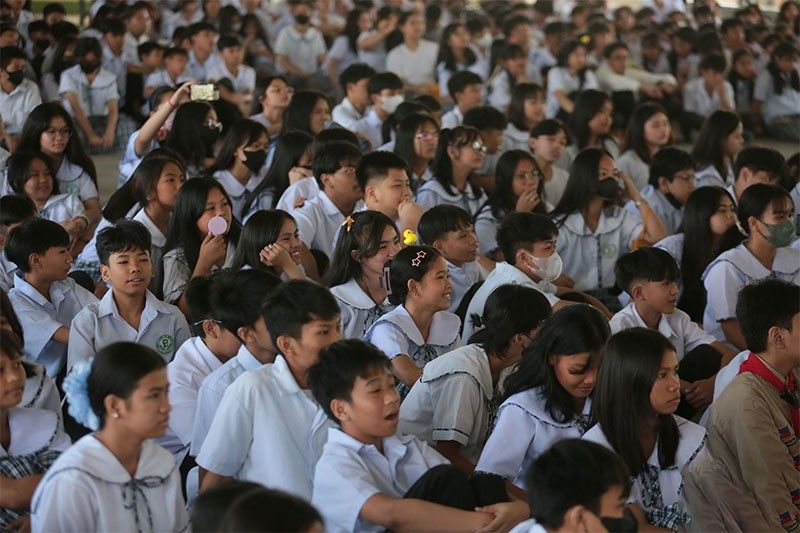DOH to schools: Defer field trips, sport activities

MANILA, Philippines — Field trips and outdoor activities for students should be canceled in areas experiencing heat index under the extreme danger category, the Department of Health (DOH) advised education stakeholders yesterday.
In a department circular, the DOH said that if an area is placed under extreme danger category, meaning it is experiencing a heat index equal to or greater than 52 degrees Celsius, any organized outdoor or physically intensive activity should be called off.
“Modality shifts in schools and even in workplaces are highly recommended,” the health department said.
Modality shifts refer to alternative modes of learning and working in lieu of physical or onsite attendance.
For areas placed under the danger category (42 to 51 degrees Celsius), the DOH said that activities for unacclimatized individuals and those at high risk for heat illness, including vulnerable workers and elderly persons, should be restricted.
“Reschedule activities to a cooler time of the day and increase the number of rest periods, hydration breaks and frequency of substitutions during practice and competition,” it added.
In areas under extreme caution (33 to 41 degrees Celsius), rescheduling of activities is also recommended and the number or rest periods and hydration breaks should be increased.
For areas under the caution category (27 to 32 degrees Celsius), the DOH advised to keep activities restricted, but monitor participants for signs of heat illness.
“Exposure to high heat and extreme temperatures can lead to heat-related illnesses, symptoms of which include dehydration and electrolyte imbalance, diarrhea and digestion disorders, infections, asthma and wheezing and other injuries,” the agency said.
It added that high and extreme heat might increase vulnerable workers’ susceptibility to injuries and illnesses.
“On days when temperatures are above 32 degrees Celsius, workers have a sixvpercent to ninevpercent higher risk of injury,” the DOH said.
When temperatures reach 37 degrees Celsius, the risk increases by 10 to 15 percent.
In addition, chronic heart and kidney diseases are more likely among workers who have had repeated exposure to strenuous work at high temperatures.
In the case of children, the DOH said high and extreme heat could affect their cognitive development.
“This leads to a one-percent learning reduction for each 0.56 degree Celsius increase in temperature across the school year,” it added.
Meanwhile, the Department of Education (DepEd) needs to pour resources to ensure that all end-of-school-year (EOSY) rites in all public schools are safe amid extreme heat, the Alliance of Concerned Teachers (ACT) said yesterday.
After the DepEd prescribed that EOSYs from May 29 to 31 be held in indoor venues or well-ventilated areas to avoid exposure to extreme heat, the ACT stressed that the agency should provide supplementary funds to cover what schools need to conduct graduation and moving-up ceremonies safely.
While schools have maintenance and other operating expenses (MOOE) funding, these could only cover regular operation expenses, like utilities, supplies, small repairs, equipment, salaries of job order workers and budget for activities, according to the ACT.
“Prior to the reopening of classes after closure during the pandemic, the ACT has long demanded from the government to allocate supplemental budget for the doubling of school MOOE to cover needed improvements in classroom ventilation and school facilities and to avoid teachers and school heads from dipping into their own pockets to get things moving,” ACT chairman Vladimer Quetua explained.
“Now that we are faced with exacerbated conditions in schools due to extreme heat as the end of the school year approaches, the DepEd must ensure that all the needs in wrapping up the school year are adequately met. With sufficient funding, we can ensure suitable venues for students, parents and teachers in holding graduation and moving-up ceremonies,” Quetua added.
For public schools, the DepEd earlier said that expenses related to EOSY activities shall be charged to their respective MOOE account, “subject to existing guidelines.”
“No DepEd personnel shall be allowed to collect any kind of contribution or fee for the graduation/moving-up ceremony,” the agency warned.
The ACT said that worsening conditions in classrooms amid dry season heat waves call for sufficient funding for education and the doubling of the MOOE of each public school.
“This is not just a short-term solution to the climate crisis problem, but part of the steps to address the learning crisis. If sufficient funds are available and used to build adequate classrooms and facilities and fill other major gaps such as teachers and staff, our education system will be ready and able to respond to any problem that (may) arise,” Quetua said. — Neil Jayson Servallos
- Latest
- Trending
































